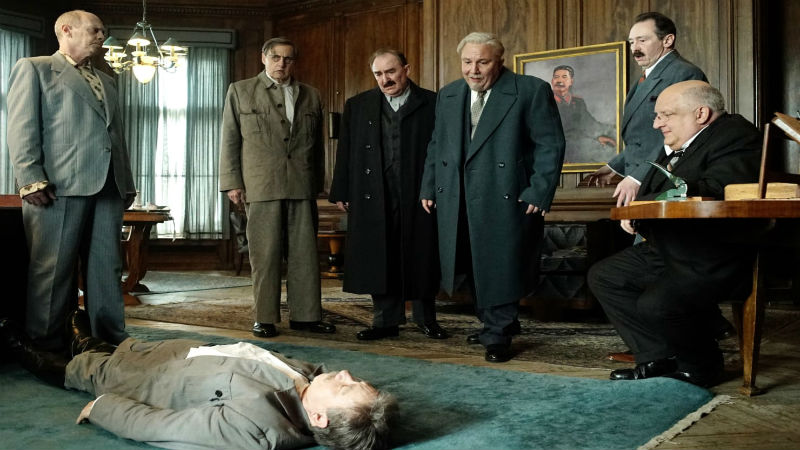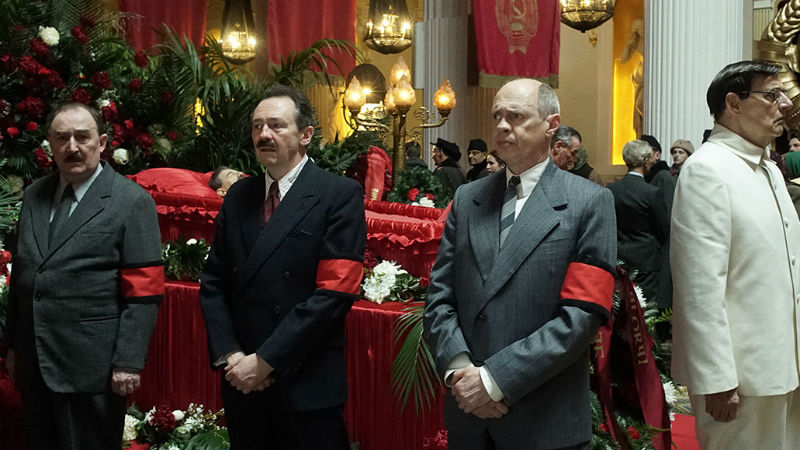




The British and the French have joined efforts! Not a headline you’d come across very often nowadays, is it? But it has happened. It must be for a good cause, mustn’t it? Did they get together in the fight against LGBT hatred? Or are they making a joint statement against xenophobia? Perhaps they got together in order to slam the Pussy-Grabber-in-Chief across the pond? But no. Instead the two countries joined efforts in order to mock and slander the Russians, creating an international co-production just so full of ignorance and prejudices that it’s hardly bearable to watch.
I’m not an unconditional russophile. I have severe reservations about the country and its history isn’t without very serious oppression. Films exposing the horrors of Stalin’s regime are very necessary. I recently wrote about the outstanding Estonian In the Crosswinds (Martti Helde, 2015), which reveals that Stalin removed 40,000 people from the tiny Baltic nation into forced labour camps and exile in Siberia. But The Death of Stalin isn’t a a denunciation film. It’s simply an exercise of bad taste (and not the type of bad taste that we like at DMovies).

Adapted from a French graphic novel, The Death of Stalin is not a mockery of Stalin. In fact, the Soviet tyrant hardly appears in the movie. He dies in the very beginning. The Death of Stalin is a mockery of every Russian: every single character here is portrayed as imbecile, selfish and incompetent. The film, launched to coincide with the 100th anniversary of the Russian Revolution, is a profoundly inaccurate, disrespectful and insensitive representation of the largest nation on Earth. It’s the testament that anti-Russian sentiment, resentment and propaganda are well alive in Western Europe almost three decades after the end of the Cold War.
The movie revolves more or less around the immediate aftermath of Stalin’s death (played by Adrian McLoufghlin), as his body lies in a pool of urine and his associates squabble endlessly over what to do with it. His successors Georgy Malenkov and Nikita Krushchev are played by Jeffrey Tambor and Steve Buscemi, respectively. Michael Palin plays his protégé Vyacheslav Molotov, while Andrea Riseborough and Rupert Friend play his children Svetlana and Vasily. A wealth of actors whose combined market value is probably enough to buy you a whole village in the South of France, somewhere near Nice.
Everything about the film is very un-Russian. Not only everyone speaks English and even the signs are in the language of Shakespeare, plus also the actors don’t look particularly Russian. The round Slavonic faces are fairly absent. The body language isn’t Russian, either. Russian are mostly stern and stoic, not the goofy scoundrels created by the Scottish satirist Armando Iannucci, who directed the film. The f-word is used abundantly throughout, as are jokes about “kicking the arse” and “sticking a crucifix…”, yes the very same orifice. How witty.

Blimey, but this is a comedy, isn’t it? This is a mockery and so it’s intended to be barbaric and exaggerated, right? Well, comedy is not a carte blanche for bigotry. There are limits of what’s acceptable. We have grown to dismiss blackface and exaggerated representations of homosexuals as a no-go. The humour of The Death of Stalin is plainly founded on xenophobia and prejudices, and so it belongs in a very similar category. This is not black humour, this is blackface. Laughing at someone dead on a pool of piss is neither funny nor subversive. It’s simply silly and vulgar. Despite the presence of Michael Palin, The Death of Stalin simply isn’t The Life of Brian (Terry Jones, 1979).
By comparison, how would people in the UK feel about a film mocking Churchill? My comparison is neither frivolous nor untimely. Firstly, Churchill and Stalin ruled at roughly the same time. And a film about Churchill was made earlier this year, which did little but to celebrate the resilience of the British leader. Plus another one is being released in a couple of months, and it looks like it’s going to be just as celebratory of the “greatest British person ever”. Can you imagine if either of these films laughed at Churchill’s dead body, his alcoholism, his racism or his gassing of people in Mesopotamia? It would cause an outrage. Well, I think that people in glasshouses shouldn’t throw stones. That’s why I recommend that you don’t watch The Death of Stalin. That is, unless you simply love to hate Russia, and have no interest in their culture.
Cinema isn’t alone in its biased portrayal of Russian history. The BBC documentary Russia 1917: Countdown to the Revolution paints Soviet leaders and foible and hesitant, and it even questions whether the Russian Revolution – as grassroots as a revolution can be – was in fact a coup d’état. You can watch it (or not) by clicking here.
The Death of Stalin is showing in cinemas across the UK on Friday October 20th. It’s out on all major VoD platforms in April 2018. On Netflix on Wednesday, April 28th (2021).
















